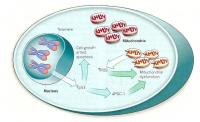In September 2015 I received two gene therapies. The first was designed to inhibit age-related muscular wasting caused by a protein called myostatin, and it was injected into my leg muscles. The average person loses a full 50% of his/her muscle mass by age 80. This age related muscle loss, known as sarcopenia, is implicated in many age-related disorders, and results in poor quality and quantity of life.
The second was designed to prevent an important aspect of cellular aging, namely telomere shortening. Telomeres are protective caps of chromosomes, which shorten as we age. The progressive shortening of telomere leads to increase in senescent cells, increase in loss of cells, and increase in cancer risk. Shorter telomeres have also been linked with higher likelihood of having cardiovascular disease, type-2-diabetes, chronic obstructive pulmonary disease, and some forms of dementia.
My resultsBefore I underwent the therapy procedure, my white blood cell telomeres were measured in September, 2015 by SpectraCell’s Texas laboratory, using a blood sample. They were determined to be unusually short, meaning that I was aging much faster than others my age. According to my telomeres, I was supposed to be in my mid-sixties.
In March 2016, my telomeres were again measured by SpectraCell. I had already started at a disadvantage, which multiplied the anticipation anxiety. Thankfully, the results exceeded all my expectations. They showed that my telomeres had been extended from an initial 6.71kb to 7.33kb, meaning that my cells grew younger by about 20 years in only 6 months. The gene therapies had restored my telomeres in these cells to my normal age. I hardly dared to hope there was room for improvement still.
In 2018 I went again for testing at SpectraCell. My telomeres further increased from 7.33kb in 2016 to 8.12kb in 2018, equivalent to another decade of cellular rejuvenation.
https://bioviva-scie...by-liz-parrish/




































































